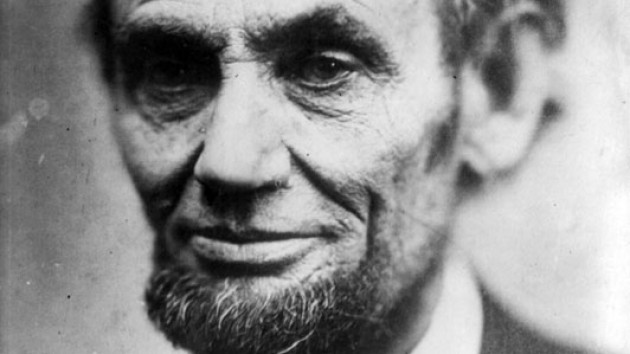The historian in me couldn’t resist seeing the most recent cinematic effort to portray history, what I hoped to be a compelling presentation of one of my historical heroes, Abraham Lincoln. Historical dramas are the stuff of Hollywood. History offers spectacle and tension that epic moments are rife with, but, to the challenge of the screenwriter, the outcome is known to the audience. The tendency of the writer therefore is to bend history by inserting plot devices, conversations that never occurred, people that didn’t exist, to heighten the peril faced by the protagonists. History frequently takes a beating in a drama well told for effect.
Steven Spielberg faced just such a challenge in his current movie, Lincoln . The sweep and scale of the Civil War and Lincoln’s pivotal role in it has received more scholarly attention than perhaps any time in American history, and the role of President Lincoln has reached mythical status. The many faces of mythic Lincoln , Lincoln the Western Logsplitter, Lincoln the Emancipator, Lincoln the War Leader, and Lincoln the Shakespearean Martyr, play to our current image of this enigmatic historical figure. Spielberg was determined to humanize the Olympic stature of Lincoln, and decided to focus therefore on the interactions of Lincoln the man in a very small sliver of the Civil War saga, the role of the President in achieving the passage of the bill promoting a 13th amendment to the U.S Constitution, abolishing slavery and enforced servitude.
The movie therefore attempts to show us Lincoln , the human, at a moment requiring masterful political abilities. Necessarily, the typical background for animated a historical drama, dramatic action scenes, are riskily absent from this movie. The movie instead maintains a laser focus on the artillery like bombardment that Lincoln faced every day of his Presidency in the form of an overwhelming plethora of pressures. The scope of crushing forces attempting to suffocate his will are told to brutal effect. The President faces as a result of his actions to attempt to preserve the union a daily butcher’s bill of hundreds if not thousands of casualties that touch those immediately around him, in a war seemingly without end.. As if the God wanted to assure the personal understanding of such loss, He takes Lincoln’s little boy Will to fatal illness, plunging his already unstable wife Mary into a spiral of depression, self absorption, and irrational acts. He faces a majority in legislature that wants to destroy the South for its irretrievable sins of slavery and secession, making the elements of a potential re-union all but insurmountable, and a minority Democrat party that was never willing to make the elimination of slavery a priority of peace. He faces war profiteers, two faced cabinet men, deserters, and a thousand years of racial prejudice in daily battle.
All of these forces lead to the Lincoln we see in the image above – weary, aged, and introspective. The daily deluge seems impossible to tolerate, yet this man faces them with a grim determination that is absent from today’s politician, with an innate belief in the founding principles of the nation and an unalterable conviction in the role of Divine Providence. It takes a great actor to portray the human condition as it exists in a character, and Daniel Day Lewis achieves this in one of the great performances of our generation. Frankly, Lewis saves the movie from itself, as the scenes project a certain redundancy in Lincoln’s daily stresses and challenges, and script’s need to put constantly profound statements in the President’s mouth to propel the story forward. Perhaps for the first time, we see Lincoln the man, struggling with himself and his family, as he faces the need to finish the job he played a pivotal role in starting. This is no cartoon hero Lincoln. This is a man who seeks an end that will in some way provide some justice to the horrific, incalculable losses. Daniel Day Lewis brings this very special man to life in a unforgettable way.
As history, unfortunately, the movie takes some huge assumptions that cheapen the learning lessons of the film. Focusing on the politics of the Amendment abolishing slavery, the movie gives only thready information as to how men and woman at that time could hold such divergent views as to humanity. Rather than careful interpretations as to the intensity of people’s convictions at the time, we see men throwing bedrock philosophies overboard for a few dollars or a patronage position. African Americans on the President’s house staff in the movie are projected as fully politically aware and engaged, yet Frederick Douglas, a huge intellectual force effecting Lincoln’s way of thinking is essentially no where to be found. Thaddeus Stevens, a powerful abolitionist in the House, is given the key role in achieving the desired end of the bill, though there is no historical narrative that suggests that was the case. The South projects in the movie essentially only as a little seen foreign force, and the peace delegation injected in the movie comes off as cartoonish and delusional.
As educational and formative entertainment, it doesn’t seem to me the movie quite works as successfully as Spielberg’s other historical drama, Saving Private Ryan. The special performance of Daniel Day Lewis, however, in making the epic Lincoln someone we could recognize and understand as a human being, is enough to make the effort to see the movie through a worthy one. So little of our nation’s formative narrative is placed in front of our population nowadays that even a flawed attempt by Spielberg is a valued one. Maybe this we lead to some better efforts to combat the nation’s ignorance on how we got here, and where we are going.
